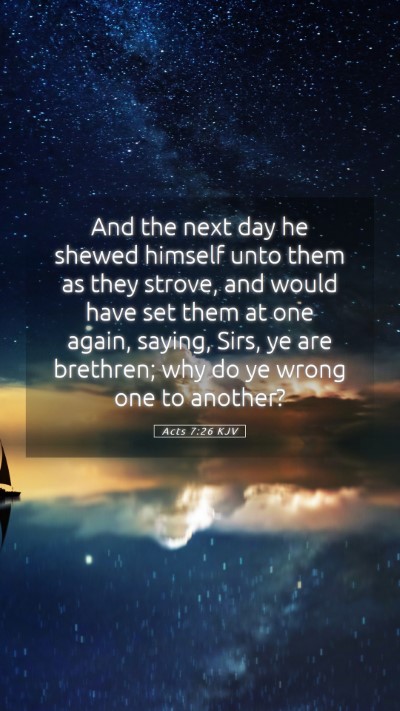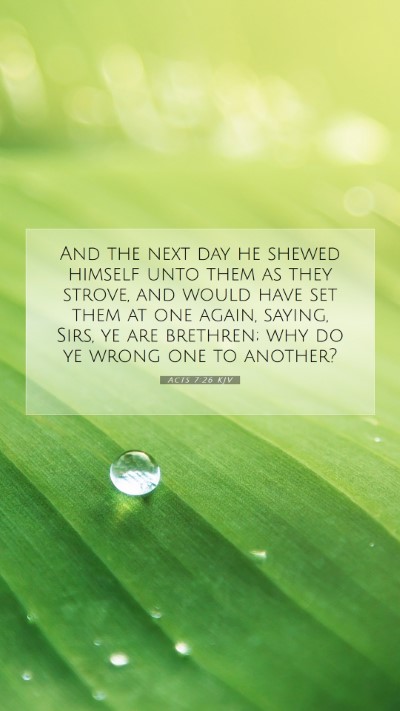Acts 7:26 - Bible Verse Meaning and Commentary
Verse: Acts 7:26 - "And the next day he showed himself unto them as they strove, and would have set them at one again, saying, Sirs, ye are brethren; why do ye wrong one to another?"
Overview of Acts 7:26
This verse is part of Stephen's speech before the Sanhedrin, where he recounts the history of Israel and highlights the rejection of God's messengers. In this particular moment, it refers to Moses' early life when he observed two Hebrews in conflict.
Combined Insights from Public Domain Commentaries
-
Matthew Henry: Henry emphasizes the moral implications of Moses’ intervention, illustrating how he sought to mediate between the two brethren. He highlights that this act reflects Moses' innate sense of justice and his desire to unite his people rather than allowing discord to reign among them.
-
Albert Barnes: Barnes provides contextual understanding, noting that this incident marks a pivotal moment where Moses began to grasp his identity as a deliverer of his people. He interpreted the struggle among the Israelites as a reflection of their deeper social strife and God's call upon Moses’ life.
-
Adam Clarke: Clarke delves into the implications of Moses’ words, pointing out the title of 'brethren' aimed at reminding the Hebrews of their shared ancestry and covenant with God. He underscores the tragic irony in their inability to recognize their kinship, foreshadowing the rejection of Moses by his own people.
Meaning of Bible Verses - Expounded
The exploration of Acts 7:26 offers vital insights into the themes of kinship, conflict, and the unifying call of God. This verse serves not only as historical recounting but also as a theological reflection on the nature of God's chosen leaders and their relational dynamics with the people they aim to save.
Biblical Exegesis and Historical Context
Understanding this verse requires attention to the broader narrative seen in the first seven chapters of Acts. Stephen is making a case for God’s ongoing deliverance through Moses, who was appointed to act in leadership yet faced rejection. This sets up a parallel to the rejection of Christ that Stephen would elucidate further.
Application of Acts 7:26 in Daily Life
This verse inspires individuals to seek reconciliation among conflicts in their own lives, urging the faithful to embody the principles of kinship and unity. It offers a reminder that true leadership involves serving and bringing people together, rather than allowing division to prevail.
Significance and Cross References
Acts 7:26 relates closely to several other biblical texts that illustrate similar themes:
- Exodus 2:11-12: The original account of Moses witnessing the quarrel.
- John 1:11: Parallels Moses' rejection by his people with the coming of Christ.
- Galatians 5:15: A reminder against biting and devouring one another.
- Matthew 18:15-17: Christ's teaching on resolving conflicts within the community.
- 1 Peter 2:10: The call to understand the identity as a chosen people, echoing Moses' appeal to brotherhood.
Conclusion
Acts 7:26 encapsulates significant themes of leadership, conflict resolution, and the call to unity amongst God's people. For deeper Bible verse meanings and bible verse interpretations, studying verse context and historical background is essential. This serves those engaged in bible study groups, in search of bible study insights, and as part of their scripture analysis.


